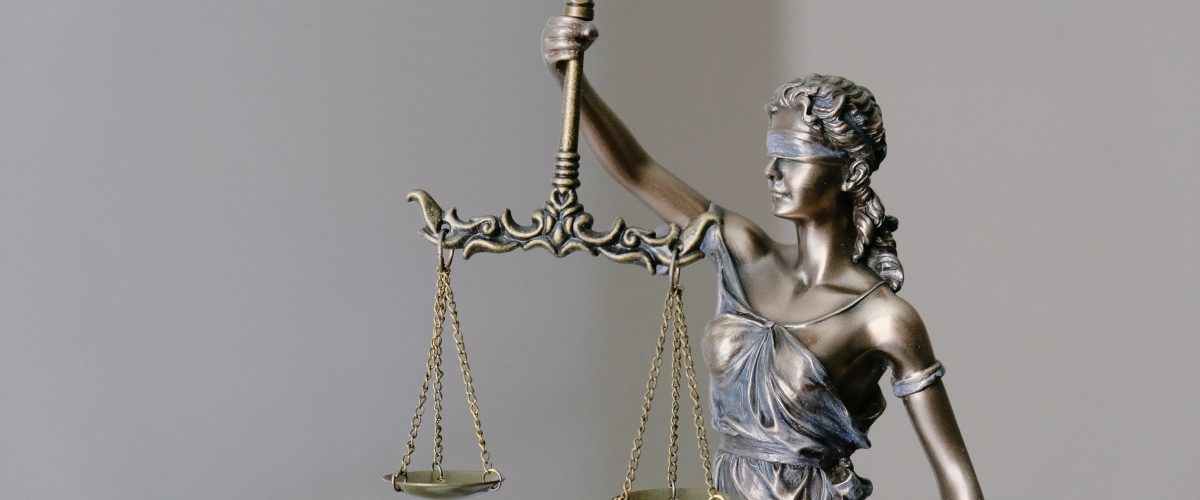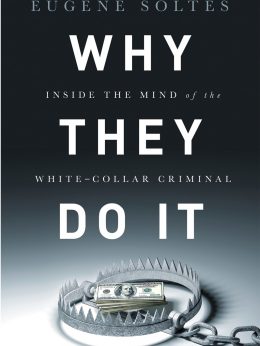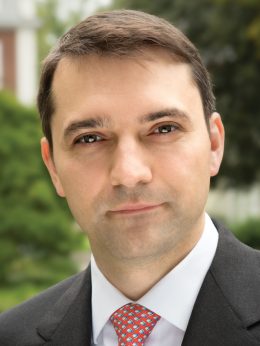
The Daniels Fund Ethics Initiative Collegiate Program gave students a chance to learn from an expert in white-collar crime and corporate integrity: Eugene Soltes is a professor at Harvard Business School, the author of a best-selling book, and, in the course of his research had regular phone calls with Bernie Madoff. Inspired by watching a late-night crime show, he decided to write letters to white-collar criminals behind bars. Dozens of interviews and several years later, he published the best-seller Why They Do It: Inside the Mind of the White-Collar Criminal.

The Daniels Fund Ethics Initiative (DFEI) Collegiate Programs at CU Denver Business School and Colorado Law partnered with the Colorado Chapter of the Association of Certified Fraud Examiners to bring Professor Soltes to Colorado virtually to speak about ethical principles and corporate governance methods to reduce ethical breaches.
So…Why do they do it?
One of the key issues, Soltes said, is psychological distance: a lot of corporate cultures don’t instill a “feeling of wrongfulness” about white-collar crimes. In fact, bribery wasn’t even illegal until the ‘70s, and insider trading wasn’t illegal until the ‘80s.
“Lots of murky conduct falls in between the lines of legal and illegal and that’s where there’s a lot of money to be made,” said Soltes.
Soltes said business cultures tend to lack the internal feeling that something isn’t right when it comes to those kinds of crimes. Combine that with a lack of empathy, rapid decision making, a hero complex, and ethical blind spots and you have a recipe for wrongdoing.
“Professor Soltes talked about how we all think that simply knowing what is wrong will stop us from crossing that line, but what we really need is the feeling that something is harmful,” said CU Denver MBA student Sarah Tuttle. “If we know our actions will harm others, that knowledge will stop us from starting down the slippery slope.”
The psychological distance is key, Soltes said. In addition, many of the white-collar criminals he interviewed justified their actions with the existence of more serious crimes.
“The people who engaged in insider trading felt like it was better than perpetrating a fraud,” Tuttle recalled. “Those who had perpetrated a fraud felt like it was better than carrying out a Ponzi scheme. Those that had carried out a Ponzi scheme felt like it was better than being a bank that lost millions of dollars. They seemed to believe someone else was always the real villain.”
Soltes helped make students aware of these traps and cautioned they must be vigilant against them in the professional world.
“Tying this discussion into the ethical principles of our Daniels Fund Ethics Initiative Collegiate Program provided an invaluable real-world connection,” said Ira Selkowitz, DFEI Collegiate Program Director and Senior Instructor at CU Denver Business School.
So…How do we prevent it?
The primary trait Soltes recognizes in ethical leaders is humility – and it’s a trait he says the criminals in his book had less and less of as they became smarter and more successful. The key indicator of humility is leaders who ask for feedback and are able to take criticism.

“To be effective, leaders need to approach people they trust to be their sounding board and be able to receive feedback from someone they respect who might have a different perspective than their own,” Tuttle said.
However, Soltes warned that an ethics policy can be cheap talk if you’re not monitoring the culture and procedures.
“Allegations of misconduct happen every day – it’s not whether, it’s when – so it’s how you handle violations and minimize those issues,” Soltes said.
“Allegations of misconduct happen every day – it’s not whether, it’s when – so it’s how you handle violations and minimize those issues.”
Professor Eugene Soltes
Soltes says companies need to focus on measurement and evaluating whether their trainings are actually effective. To that end, more people are now using data to measure compliance efficacy.
“He used a systematic process to look at those who engaged in unethical or even illegal behavior to find commonalities,” noted Deborah Kellogg, Associate Professor of Business Analytics at CU Denver Business School. “This was the powerful part for me. Yes, there are some white-collar criminals who did truly reprehensible things, and we would all agree we would never do anything like that. But those people were in the minority. The striking part was the data of the many who committed misdeeds who were not all that different from me.”
Soltes urges corporate ethics to measure more than percent completion on trainings, and try to find a more meaningful metric. “For many organizations, I don’t think they know whether compliance and ethics affects anyone,” he said.
For instance, Soltes data revealed when ethics complaints went unaddressed, they were followed by an increase in reports for equipment repairs. He says this suggests people who feel their concerns aren’t respected tend to have less respect for company property.
Special Access to an Expert
“I loved that the event was accessible virtually,” said Dorota Raclawska, an MBA and MS Accounting student. “COVID-19 shook up the world, but if anything good has come of it I think it’s the ease of connection with people and how people have adapted.”
More than 700 attended the talk via Zoom, including students, faculty, and members of the business community.
Much is made of culture in the world of ethics, and Soltes said people often think they are stronger than the surrounding culture. However, he says even the most ethical people can be influenced by corporate culture, and most misconduct happens in groups.
‘Am I being transparent?’, ‘Is this fair?’, ‘Am I respecting others and encouraging trust in the company for the long-term?’
Questions based on principles of the Daniels Fund Ethics Initiative
The idea of “groupthink” is another threat to ethics. One way to prevent groupthink is breaking up patterns (like an “old boys club”) in the office and creating diverse spaces.
“Always keeping in mind the principles of the Daniels Fund Ethics Initiative could help with creating a culture of ethics, by posing questions such as ‘Am I being transparent?’, ‘Is this fair?’, ‘Am I respecting others and encouraging trust in the company for the long-term?’,” said Selkowitz.
The Daniels Fund Ethics Initiative Collegiate Program is a grant that allows CU Denver Business School to drive real-world application of principle-based ethics education on campus and into the community. Explore more ethics-focused events and opportunities here.


